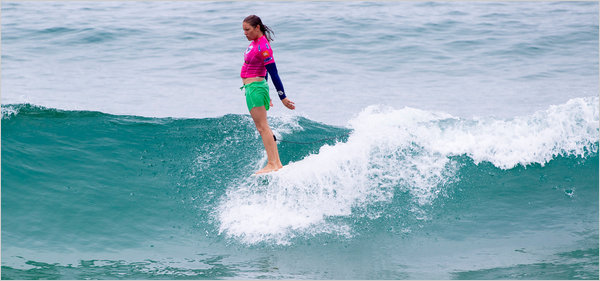Cori Schumacher during the longboard championships in France in July. She is boycotting an event in China because of “deep political and personal reservations.”
By ZACH WEISBERG, Published: March 26, 2011, on nytimes.com

Schumacher has raised awareness for gay rights in surfing, which she described as “massively homophobic.”
As a woman and a longboarder, Schumacher struggles at the bottom of surfing’s hierarchy. But instead of toeing the line, she has taken an unusual approach, using her success in the water as a platform to take a stand on issues in hope of enacting social change in her sport and beyond.
Schumacher, 33, was born into surfing. Her parents, Jeannette and Craig, met in the ocean in Newport Beach, Calif., and her mother, then a professional shortboarder, rode waves until she was eight months pregnant. On weekends, they would pack their truck full of surfboards and head from San Diego to Mexico to camp on the beach. Schumacher knew she would become a professional surfer when she was 12. The question was how, given that few women (and a handful of longboarders) are able to earn a living through surfing.
In Costa Rica in 2001, Schumacher won her second world longboard title but realized she could not support herself. She walked away after turning down $2,000 for a yearlong sponsorship.
“I was like, I can’t do this anymore. This is ridiculous,” she said. “So I just totally quit.”
Schumacher now works as a waitress at Naked Cafe in Solana Beach, Calif. She still surfs daily and returned to competition in 2005.
“I promised myself that I wouldn’t do the things that left me really disenchanted with competitive surfing in the past, so I stayed away from sponsors and just did it on my own and have had a really cool time,” she said. “It’s allowed me to have a different perspective on things, because I really care about women’s longboarding — instead of ‘I really care about my career in women’s longboarding.’ ”
Henry Ford, a pioneering California surfer who is the president of the World Longboard Association, said: “I can’t tell you how important it is for women’s surfing to have some kind of champion. And I think Cori Schumacher is trying to set the bar so that there is some respect for the women’s side of surfing.”
In keeping with her principles, Schumacher is boycotting the ASP Women’s Longboard Tour because it planned an event on Hainan Island, China.
“I have deep political and personal reservations with being a part of any sort of benefit to a country that actively engages in human-rights violations, specifically those in violation of women,” she wrote in an e-mail to ASP administrators.
No professional surfer had shunned a major competition since 1985, when several began boycotting an event in South Africa to protest apartheid.
But Schumacher, who in 2008 wed her longtime partner, Maria Cerda, has a history of advocacy, especially for women. She has raised awareness for gay rights in surfing, which she described as “massively homophobic.” Schumacher also became involved with the San Diego Coalition for Peace and Justice to oppose the war in Iraq.
“For me, getting real turned off had to do with how women were treated at the contests in the ASP and how women were treated within the surf industry,” she said. “You have to look this particular way, have to have no views, have to be somebody who is basically like a blank billboard upon which a brand can assert their image, and that just never sat well with me.”
Keala Kennelly, a shortboarder from Kauai known for her fearlessness in big waves, is one of the fortunate few who earn a living through surfing, but she sympathizes with Schumacher. She, too, has been outspoken, and believes that has, at times, hampered her career.
“There are companies in this industry that wouldn’t touch me with a 10-foot pole,” Kennelly wrote in an e-mail.
“I commend Cori on refusing to play that game because she could so easily have been sponsored,” added Kennelly, who is sponsored by Billabong. “She is beautiful, smart and talented. I know she works really hard during the day at her job, but I bet you she sleeps really well at night knowing she hasn’t compromised herself.”
The ASP women’s longboard world championship has struggled to find consistent sponsorship, as has women’s surfing. Only 17 women compete on the shortboard world tour, compared with 34 on the men’s circuit. The largest prize in women’s longboarding is $50,000, compared with $1 million for a new men’s shortboard competition in New York. Last year, money issues forced the women to cancel the final shortboard event of the season.
Meg Bernardo, the executive manager for ASP North America, said the athletes must push for change.
“I think that women’s overall surfing is just having a real hard time right now with sponsorship,” Bernardo said, ”and it will really come from the women making a stand about how women are portrayed. If they’re not happy with it, then they’re the ones who have to go back to the brands, because the brands are really driving the events.”
Roxy, the women’s division of Quiksilver, is one of the few major surf companies to invest in women’s longboarding. It has sponsored the world championship in Biarritz, France, since its inception in 2006.
“We made a conscious effort about five years ago to again support women’s longboarding, mainly due to our own surfers communicating that this is what the sport really needed,” said Danielle Beck, the vice president for marketing at Roxy, wrote via e-mail. “Authenticity is the most important thing to us, and we would never ask a surfer to change who she is to fit the mold.”
Schumacher seems unconvinced.
“Here’s a company who talks such an amazing game, and yet in their advertising, they’re cutting off women’s heads,” she said, adding: “Over the years, the rhetoric has changed. They’ve embraced more enlightened language, and yet through their advertising, they’re marketing the same things, and that doesn’t make sense to me.”
Most women have a cautious eye on the future. Nearly all of the touring competitors work full-time jobs: firefighter, nurse, teacher — even a chemist. As for Schumacher, she said she planned to finish her undergraduate degree in psychology or sociology. Eventually, she said, she would like to become a teacher and write a book.
Jen Smith, a two-time longboard world champion, is one of the Roxy athletes responsible for revitalizing the company’s investment in longboarding. She expresses gratitude for the support, but she remains pragmatic about her future as a professional surfer.
“It’s nothing you can retire off of,” Smith said. “When it’s gone, it’s gone.”
As Bernardo said, “Surfing doesn’t offer any type of retirement plan.”
A version of this article appeared in print on March 27, 2011, on page SP12 of the New York edition.


Now why can’t we have more people in the world with this strength of character? So many are swayed and so few a rock!
I sigh with relief that this is being spoken, I have been trying to learn how to surf as a gay woman for years and it is hard to find guys who will share the culture with a woman who isn’t a potential shag and seeing as there are hardly any girls in surfing I am so often alone trying to figure it all out or worse in homophobic macho environments where I am an complete outsider, I had a particularly bad experience with Amado surf school in Carrapeteira in Portugal
http://www.amadosurfcamp.com/
who wasted my time and money and whose loose pitbulls back at camp had a go at me in the bargain, the environment was hyper macho and they couldn’t seem to believe that I had any ability to learn beyond the ultra basics despite me having spent 2 years teaching myself.
It is not easy to be a rock when you are alone amongst all the bullshit.
I remember Yarrow. four years and thousands of clients later I still remember her, why? What’s so special about her?
60% or our clients are women both straight and gay. Nearly 100% of them make incredible progress in their surfing while they stay with us. We welcome gay&lesbian clients, as we welcome any client, we don’t care about race, nationality, religion, sex, sex orientation, age, physical condition, you name it! We even have gay staff members proud of being gay!
Her socializing problem had nothing to do with her sexual orientation or sex, it had to do with her as an human being.
Pretending she had a better surfing ability than she actually had, this was the stumbling block preventing her for making progress as she wouldn’t listen to her surf instructor.
Thinks change over the years, so maybe she has got over it! As for the dogs we just have Evil a very old american bullterrier with a caniche mentality and a little yorkshirish dog. 99,99999% love them, it is not 100% because Yarrow didn’t.
We love you all at http://www.amadosurfcamp.com.